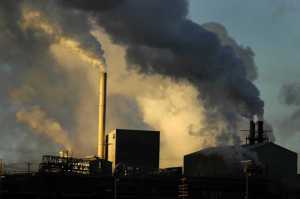The Intergovernmental Panel on Climate Change (IPCC) on Monday February 28, 2022, released part two of its Sixth Assessment report, indicating that the climate crisis will cause unprecedented damages, unless governments take urgent measures to lower emissions.

The report further noted that adaptation measures cannot replace emission cuts.
In the wake of the report, climate activists across Africa are calling on the world’s biggest polluters to take urgent action to cut emissions, to avert worse climate impacts and unprecedented costs to the vulnerable region.
They have also called on the developed world to make good on pledges to support African nations to adapt to climate change and address loss and damages, as the continent bears the brunt of climate change, despite contributing negligibly.
Landry Ninteretse, Regional Director at 350Africa.org, said: “Fossil fuels continue to drive the climate crisis, leading to widespread devastation in vulnerable regions such as Africa where extreme and frequent weather events are being regularly experienced. The IPCC report calls for urgent action to meet mitigation and development goals. This means developed nations need to not only fulfil their promise of drastically reducing their emissions, and also commit finances towards adaptation, but also clean energy transition, technology transfer and mitigation in the Global South.”
Evelyn Acham, National Coordinator of Rise Up Movement, said: “More than ever, the science is now clear on the need to rapidly move away from fossil fuels, meaning that projects such as the East Africa Crude Oil Pipeline (EACOP) should not see the light of day. The climate impacts from the pipeline would surpass the potential financial gains as the emissions from burning the oil are estimated at 33 million tonnes of carbon dioxide per year. We are calling on Total to heed the call to halt this harmful project, and financial institutions to commit to not financing EACOP. Focus should instead shift to investing in sustainable, clean energy sources.”
Justin Mutabesha of Fossil Free Virunga said: “The time to stop the exploration of fossil fuels, which are destroying our planet, is now. The report is clear that we must accelerate plans for emission cuts. This means there is no place for fossil fuels in our world. We have been calling on the government of the Democratic Republic of Congo to stop the issuance of oil licenses in Virunga National Park.
“We cannot continue to endanger our communities, our wildlife and put sensitive ecosystems at risk. We are renewing this call and would like to call for continued resistance to oil exploration in Virunga.”
David Michael of Coal Free Nigeria said: “The price we would have to pay for climate inaction or delayed action would be great, more so for us as Africans. We mustn’t wait to see even worse climate impacts, which will come at a great cost to our economies, our people and the environment. The developed countries that contribute the most to emissions that are wrecking our planet have to act fast.
“Here in Nigeria, the Federal Government should abide by its commitment to the Paris agreement to reduce greenhouse gas emissions and halt the issuance of coal mining licenses, and instead support investment in renewable energy. We also call on the Nigerian Government to quickly begin the implementation of the Climate Change Act.”
As the IPCC report is released, 350.org is mobilising local groups and climate activists for a month of global climate justice protests. In Africa, the actions began on Wednesday, March 2.
